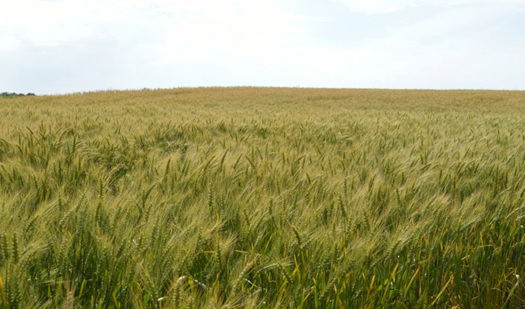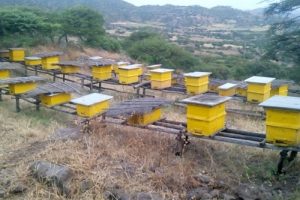
The Ethiopian cooperatives’ Labor Commission is working energetic to shorten the sluggishly functioning and extended value chain of wheat market which is going to be harvested in the current dry season cultivated through irrigation system and supplied by cooperative unions.
The cooperatives labor commission is also prepared to provide loan to them to facilitate the market. To obtain the finance, it dealt with banks and other stakeholders.
The dry season wheat cultivation through irrigation farm both in the low and high land parts of the country is backed by the government.
And at this season the crop is cultivated in 404,900 hectares land and 16 million quintals wheat is expected to be harvested and out of it 9.63 million quintals will be supplied to the market.
According to the Ethiopian Cooperative Labor Commission Deputy Commissioner Abdi Mumed, in the first round of the dry season wheat cultivated by irrigated farm product 1.3 million quintals will be supplied to the market by the cooperative unions.
As to Abdi, 47 cooperative associations from Oromia, Amhara, Southern Nation and Nationalities regions will participate in supplying the product to the market.
According to the Cooperative Unions’ Commission Marketing Directorate Director, Yirgaalem Enyew, the harvested crop from wheat irrigation farm will be supplied to institutions such as National Disaster Risk Management Commission, the Ethiopian Trade Business Corporation and the Industry Inputs Cultivating Organization.
The commission identified problems that the cooperation association may face during the marketing process and among others limitation in collecting sufficient amount of harvested crop as per the market’s demand from farmers which plow their farm in the fragmented places. In addition, shortage of finance which facilitates purchasing and selling of products may be a bottleneck.
According to the study conducted, the cooperative associations have 188.4 million Birr initial working capital. They can also obtain 38.5 million Birr from finance saving and credit associations in the form of loan.
Nevertheless, to perform the market activities in their full capacity, they need to secure loan worth of 3.3 billion Birr from other financial institutions, Yirgalem said.
She further said that, to secure the loan the commission is consulting the matter with the Officials of Commercial Bank and Development Bank of Ethiopia. It also talked the matter with Awash and Oromia Cooperative Banks. Adding she said that these Banks are selected because the cooperative associations deposited their money in these banks.
In line with financial deficit, the cooperative associations face shortage of warehouse to store the harvested crop. To mitigate the problem the commission advised the cooperatives associations to supply the products to the market in the speedy way and to borrow warehouses from the nearby institutions.
Nevertheless, the commission did not deny that illegal actors in the wheat value chain might distort the market and even send the product to neighboring countries for their own ill gains which affect the real consumers. But the commission will try its level best to curb the illegal practices.
As to her, most traders engaged in illegal activities are legally registered and have trade license. Others are also involved in the trade activities with no license. therefore, through scrutinizing them punishing and deterring their malpractice must be taken as a way out. Others should also come to the formal channel forcefully to do their business activities.
As to Yirgalem, while farmers devote their labor, time and asset to cultivate the crop, illegal traders in collaboration with the brokers exploit the farmers’ labor unfairly and such practice must be halted.
Illegal traders with no putting formal investment amass wealth unfairly and again supply the product to market with inflated price that critically harms the poor who struggle to survive with limited income. Such practice in addition to bringing economic hardship on citizens, it poses social malaises. Hence, unless the current distorted market system is improved the poor will continue to suffer from artificial prices set by brokers.
Nevertheless, though the value chain has distorted the market, the price still can be said determined by demand and supply. There is also undeniable fact that the price of agricultural inputs such as fertilizer which is imported becomes skyrocketing and such phenomenon makes the production cost to be much higher.
Therefore, farmers must regain what they have invested including their labor but the involvement of brokers in the trade and the absence of warehouses forced farmers to sell their product by reduced price which in turn leave them in disadvantageous position.
Ultimately farmers became poorer and poorer and remain subsistence. However, to alleviate such problems with the collaboration of stake holders, the warehouse receipts system which is underway by the pilot program will be implemented soon. The system enables farmers to hold their products to some times which give opportunity to sell in reasonable price.
The proclamation of the receipt system was introduced 20 years ago but due to the undisclosed reasons, it was not implemented to date. But starting from this year, keeping farmers’ products such as wheat and others to sometime in collaboration with other stakeholders will be practical.
However, to implement the new project as mentioned above all stakeholders must exert their energy in a collaborative manner.
Regulating trade activities, providing license to traders is the mandate of the Ministry of Trade and Regional Integration. Therefore, to enforce the law it has to cooperate with the legal enforcing bodies such as the police, procreator and courts.
In addition, it must strengthen its inspection, connect producers and consumers and work in collaboration with all stakeholders. The commission also established task force led by the commissioner Firealem Shibabaw to monitor the market.
Ethiopia is an agrarian country and 80 percent of the population earns its living from the sector. But as to the Ministry of Agriculture’s recent information, among the product of pulses, only 15 percent of it is supplied to the market and this indicates that how the sector is subsistence. The locally produced pulse such as wheat does not meet the demand both to be used as inputs for industries and for urban household.
As a result, the government is forced to import wheat from abroad and to that end it spends its meager hard currency.
The dry season wheat cultivation through irrigation farm began three years ago both in the low and high land parts of the country. The objective of the cultivation is to substitute the importation of wheat. Year by year the output of wheat farm is increasing and currently it is possible to substitute about half of the importation and if it is continued in such pace, the nation will be not only self- sufficient it also can be exporter.
As mentioned above, the marketing system prevailed in the country very outdated and easily manipulated by brokers and illegal traders.
The poor living status of the farmers left them to be exploited by illegal traders. Because farmers do not have sufficient warehouse to store their product and knowing such weakness, brokers approach them and purchase their product by setting lower price.
Such sabotage and illegal practices have been underway for the last four decades and left farmers under poverty. The involvement of cooperative associations in collecting farmers’ products and supplying to markets can reduce the brokers’ intervention to some extent and can be applied in favor of farmers.
But making the cooperation strong enough to defend farmers’ interest, strengthening them financially is essential. To this end, the provision of loan by banks with very little interest rate is essential.
BY ABEBE WOLDEGIORGIS
The Ethiopian Herald March 25/2022





